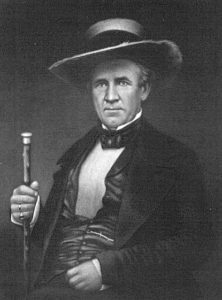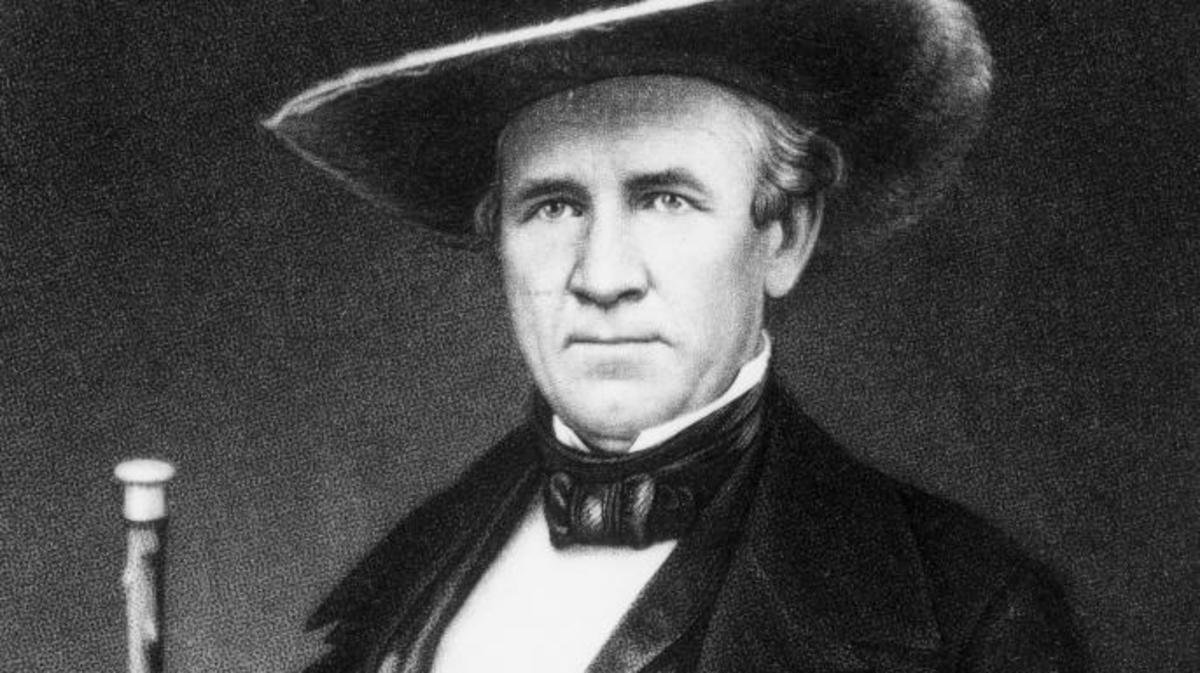While studying America, French historian Alexis de Tocqueville had the opportunity to probe the mind of governor-turned-honorary-Cherokee Sam Houston
Sam Houston’s wife left him 10 weeks after their wedding in 1829 and returned to her rich father’s plantation. Houston, who was 36 years old and governor of Tennessee at the time, wrote a rambling letter to his father-in-law that contained this heart-breaking sentence: “She was cold to me, & I thought [she] did not love me.” Then he followed his wife to her father’s house, got down on one knee and, with tears in his eyes, begged her to return to him. She refused.
The reasons why Eliza Allen Houston left her husband are lost to history, but one thing is certain: Her departure devastated Sam Houston. He returned to Nashville, started drinking heavily and then resigned as governor. After another week of boozing, Houston fled Tennessee and headed west, toward the Indian Territory.

“I have at this moment heard of poor Houston’s disgrace,” President Andrew Jackson wrote to a relative. “My God is the man mad?”
Houston fled to Fort Gibson in what is now Oklahoma, where he found his old friend, Ooleteka, a Cherokee chief. Houston had lived with Ooleteka’s family in Tennessee for several years as a teenager, after he ran away from his mother’s home. Now, Ooleteka again welcomed Houston, who settled nearby in a house he named “Wigwam Neosho” and became an official citizen of the Cherokee nation.
For the next two years, Houston lived among the Cherokees, operating a trading post and marrying a widow in a Cherokee ceremony. He also drank so much liquor so often that he earned the nickname “Big Drunk.” In 1831, the ex-governor’s wild drinking caused him to lose an election for the Cherokee tribal council.
In December 1831, Houston joined a Cherokee lobbying delegation bound for Washington, where he’d previously served in Congress. Two days after Christmas, Houston and his Cherokee companions boarded a Mississippi River steamboat bound for New Orleans. On board, Houston met a French aristocrat named Alexis de Tocqueville.
Tocqueville, then 26, had been dispatched to the United States by the French government to study American prisons. Along the way, he also set out to learn about “all the workings of that vast American society that everyone talks about and no one knows.” In nine months, Tocqueville visited 17 of the 24 states, and interviewed a wide variety of Americans. On the steamboat, he eagerly made the acquaintance of Sam Houston, whose marital woes and self-exile were the subject of much gossip aboard the ship.
“His figure is athletic; everything about him indicates physical and moral energy,” Tocqueville wrote in his notebook. He also jotted down an account of Houston’s colorful fall from power, adding this postscript: “Since then, he has lived in the midst of the wilderness, half European, half savage.” Curious about the Indians, Tocqueville asked Houston “a great many questions” and recorded their conversation in Q&A format:
Q: Have the Indians a religion?
A: Some of them have no belief in the immortality of the soul. But generally the Indians believe in a God who punishes or rewards the deeds of this life in the other world.
Q: Have they any form of worship?
A: The Osages, who live on the frontier of Mexico, pray every morning to the rising sun. The Creeks have no worship. It is only in times of great calamity, or before undertaking some great enterprise, that they devote themselves to some public manifestations of worship.
Q: What sort of government have the Indians?
A: Generally a patriarchal government. Birth makes the chiefs. Among the tribes which contact with Europeans has made more enlightened, they are elected.
Q: What is the status of women among the Indians?
A: Complete servitude. The women have to do all the unpleasant tasks, and live in great degradation.
When Tocqueville asked if the Indians were intelligent, Houston replied that he believed both Indians and black people were as intelligent as whites, and he suggested that freedom spawns intelligence while slavery thwarts it. “The Indian is born free; he makes use of this freedom from his first steps in life,” Houston told Tocqueville. “Surrounded by dangers, pressed by necessities, and unable to count on anyone, his mind must be ever active to find means to ward off troubles and to maintain his existence. This necessity imposed on the Indian gives his intelligence a degree of development and ingenuity which are often wonderful.” Meanwhile, Houston added, the black man’s native intelligence is crippled by slavery: “The first notions of existence which he receives make him understand that he is the property of another, that care for his own future is no concern of his, and that the very power of thought is for him a useless gift of providence.”
In Memphis, Tocqueville had recently witnessed Choctaws from Alabama and Mississippi being forcibly exiled to Oklahoma under the Indian Removal Act of 1830— part of an ethnic-cleansing process now remembered as the Trail of Tears. “One couldn’t watch without feeling one’s heart wrung,” Tocqueville wrote. Now, he asked Houston if whites would someday push the Indians out of the Indian Territory, too.
Houston assured him that would never happen. “The United States have bound themselves by the most solemn oaths never to sell the lands contained within those limits and never in any form to allow the introduction of a white population there.”
Obviously, Houston overestimated the permanence of those “most solemn oaths.” As Tocqueville feared, whites later seized most of the Indian Territory.
In New Orleans, Houston and his Cherokee companions caught a ship to Washington. There, Houston learned that Ohio Congressman William Stanbery had attacked him in a speech, accusing him (falsely) of corruption in his dealings with Indians. Irate, Houston confronted Stanbery on the street and pummeled him with a cane. Stanbery drew his pistol, pointed it at Houston’s chest and pulled the trigger. The gun failed to fire.
Charged with assault on a congressman, Houston was tried by the House of Representatives, found guilty and officially reprimanded. Stanbery sued him and won a judgment of $500. Houston was given six months to pay. Instead, he fled Washington and emigrated to Texas, which was then part of Mexico. Soon, he became a hero of the Texas independence movement and, in 1836, president of the Republic of Texas. After Texas joined the union in 1845, he served as a senator and governor—the only man in American history ever elected governor of two states.
Meanwhile, Tocqueville returned to France in 1832 and wrote Democracy in America, a two-volume study of the country that fascinated him. Brilliant and insightful, the book is still read, analyzed and debated by historians. In it, Tocqueville discussed what he saw as America’s paradoxes: individualism coexisting with conformity; egalitarianism with racism; religious passion with crass materialism. He also denounced America’s treatment of Indians and predicted that slavery would tear the country apart, causing “the most horrible of all civil wars.” He died in 1859, two years before that grim prophecy came true.
Originally published in the October 2010 issue of American History. To subscribe, click here.





